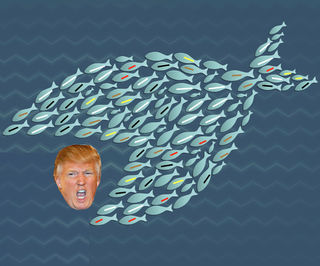President Donald Trump
The Predatory Presidency
The Trump White House is set to prey on the most vulnerable among us.
Posted February 28, 2017

The season premiere of BBC America’s Planet Earth II includes remarkable footage from the desolate Galapagos Islands. In one striking scene, baby marine iguanas race across the sand, desperately trying to elude dozens of snakes eager for their next meal. Although such stark life-or-death struggles are difficult to watch, it helps to remember that they reflect nature’s dynamic balance.
Far more disturbing — and unnatural — are the Trump Administration’s similarly ruthless predator-like attacks on whatever groups it chooses as its prey. Adding to their repugnance, several of these assaults over the past month — through a series of executive orders — are inherently racist, seemingly propelled by the ugly 14-word credo of white nationalists everywhere: “We must secure the existence of our people and a future for white children.”
Three White House orders stand out. First, there’s the determined pursuit of a Muslim travel ban, one that will prevent thousands of tempest-tossed and despairing refugees from entering the country. Second, there’s the heartless stalking of undocumented Hispanic immigrants, including the near indiscriminate roundup, detention, and deportation of law-abiding men, women, and children. And third, there’s the early blueprint for a “tough on crime” law enforcement crackdown, an onslaught that will inevitably and predominantly disrupt and besiege Black communities and activists.
These three groups, all non-white, have been selected as the initial targets for aggressive and oppressive government action (there will undoubtedly be others). To be sure, this isn’t entirely new. As Langston Hughes wrote 80 years ago, “America never was America to me.” But along with Trump himself, influential White House strategists Steve Bannon and Stephen Miller of the “alt-right” and new Attorney General Jeff Sessions have especially troubling histories of outright hostility and scornful indifference toward those who don’t share their skin color.
We’ve also seen that predators in the wild aren’t the only ones to use trickery, deception, and stealth as complements to brute force. Disguising the real impetus behind these executive orders, the Trump White House turns to sky-is-falling psychological mind games, warning us that these steps are necessary to protect the public from dire threats. The Islamophobia-nurturing Muslim travel ban is deceitfully presented as an essential counter-terrorism measure. ICE raids are defended with the fiction that millions of Hispanic immigrants are “bad hombres” and the rest are a drain on limited public resources. And repressive steps against African Americans are justified through bogus tales of a nationwide crime wave and “carnage in our inner cities.”
The purpose of these appeals is simple: to short-circuit the public’s critical reasoning; overwhelm us with emotions of fear and dread; and thereby garner either our active support or acquiescence. Once a crisis environment is created, once we begin to catastrophize and imagine the worst possible outcomes, then even the most extreme measures can begin to seem prudent. This is proven snake oil that’s stood the test of time. Recall that Nazi propagandist Herman Goering acknowledged as much when, during the Nuremberg trials after World War II, he explained:
Voice or no voice, the people can always be brought to the bidding of the leaders. That is easy. All you have to do is tell them they are being attacked and denounce the pacifists for lack of patriotism and exposing the country to danger. It works the same way in any country.
But once we recognize these manipulative psychological ploys for what they are, the path forward becomes increasingly clear. First, whenever possible, we must expose and condemn the racist falsehoods of the President and his cronies. Second, we should counter and undermine the constant fearmongering they use to advance their agenda of intolerance. And third, we need to do whatever we can to help protect the individuals, families, and communities most immediately at risk of ambush and assault.
This may sound like a daunting challenge. Fortunately, however, the mass protests and daily acts of civil resistance throughout the country over the past several weeks have already demonstrated our resolve. They’ve also revealed our capacity to expand our “circle of moral concern,” so that it extends well beyond those we hold most dear or consider most similar to us.
In nature, potential prey instinctually use a wide range of strategies to ward off attacks — from camouflage to traveling in groups to alarm signals to communal defense based on strength in numbers — and they rarely succumb without a fight. With the merciless predators from the White House now on the prowl, surely we must be prepared to do the same.
********
Note: This essay first appeared at CommonDreams.
Roy Eidelson studies, writes about, and consults on the role of psychological issues in political, organizational, and group conflict settings. He is a past president of Psychologists for Social Responsibility, former executive director of the Solomon Asch Center for Study of Ethnopolitical Conflict at the University of Pennsylvania, and a member of the Coalition for an Ethical Psychology. Roy can be reached by email at reidelson@eidelsonconsulting.com and on Twitter @royeidelson.




